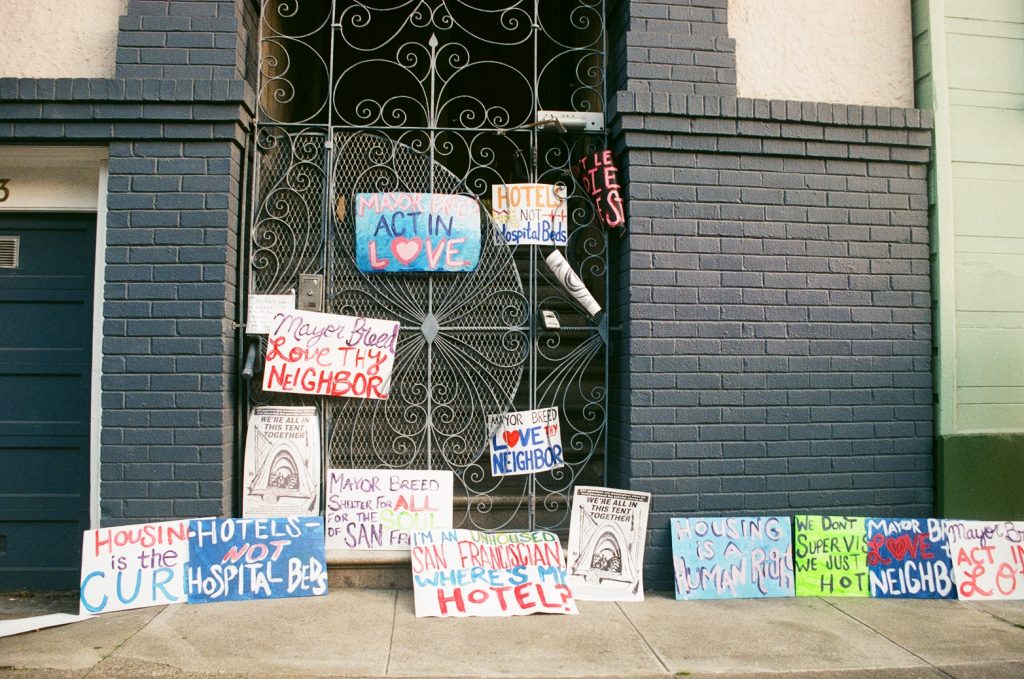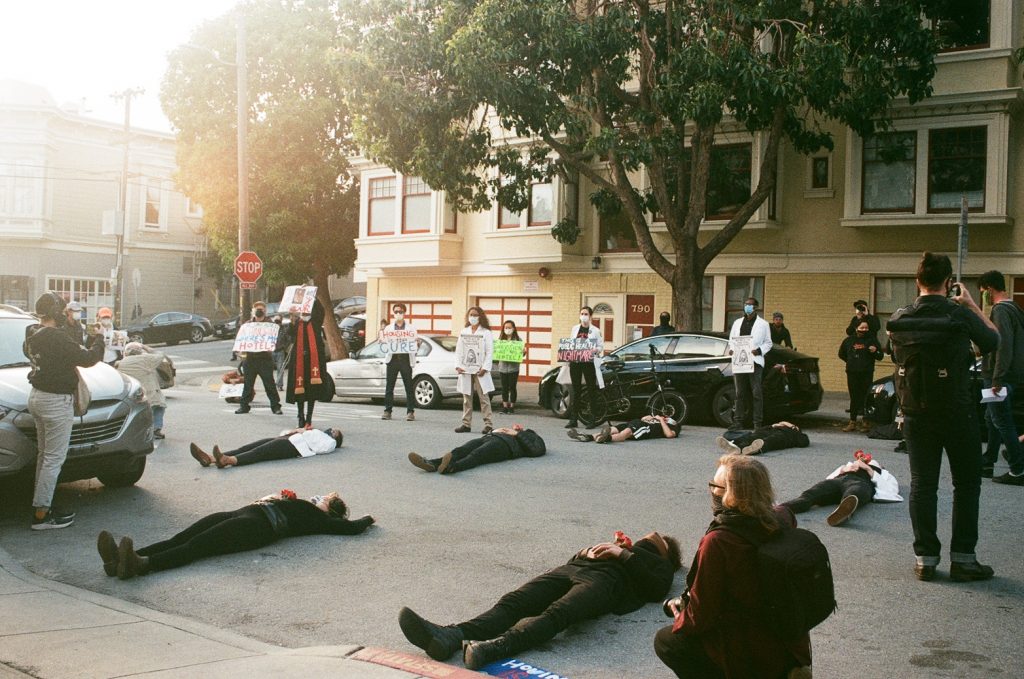
In November plans to shut down Shelter-in-Place (SIP) hotels, which are currently housing 2,400 otherwise homeless residents of San Francisco, leaked out of the COVID-19 Command Center (CCC). The hotel guests set to lose their shelter have been categorized as vulnerable by the City, meaning that they are over 60 years old or have an underlying health condition. Unhoused people and advocates across San Francisco have sprung into action to prevent the plan from moving forward, urging the City to keep the hotels open until all their guests have found permanent housing placements. Within a few weeks public officials said they would be pushing the timeline back, but as of now no specific alternative plan has been released. The documents released detailed a four-phase plan that had seven SIP hotels slated to close by December 21, which could displace over 500 residents. The sites slated to be closed first are Lombard Plaza Motel, Abigail Hotel, Americania, Good Hotel, La Luna Inn, Nob Hill Hotel and Executive Hotel Vintage Court. Seven more hotels are set to close by the end of March, another six by the end of May and the final five by June 21, 2021. All placements in hotels stopped on November 15 according to internal documents shared with Street Sheet, San Francisco’s street newspaper.
As numbers of COVID-19 cases spike dramatically, plans for what will happen to the residents and where people will go is still very unclear. According to the Department of Homelessness and Supportive Housing (HSH), hotel residents will be screened using Coordinated Entry to determine where they go from the hotels. Those who are prioritized based on the screening may be placed in permanent supportive housing. Those who are not prioritized will instead enter what’s called “rapid resolution” which can mean short-term rental assistance or merely a bus ticket out of town. But according to HSH, at least 70 percent of hotel guests have not been processed through Coordinated Entry at all.
Tiny, an organizer with POOR Magazine in Oakland, recently helped organize a demonstration outside of Mayor London Breed’s house, in part to call attention to the harm the closures of SIP hotels will do to poor and homeless people in the City.
“A hotel room can save a life, but politricksters and violent scarcity models can take our lives,” said Tiny. “This move by the SF politrickster mayor is nothing less than violence against unhoused San Francisco residents just tryin’ to get some rest.”
The perspective of a SIP hotel guest
Before the COVID-19 pandemic hit, Gillette and her service dog, Shepherd, had been moving around from shelter to shelter trying to stay safe off the streets after leaving a domestic violence situation. But when lockdown started in early March, the shelter system stopped moving people into the shelters entirely. Gillette says she missed the window to keep a long-term shelter bed by about two days, and instead was forced to brave the onset of the pandemic on the streets.
“When we left [the shelter] it seemed like a curse. I had to actually sleep outside which I had not done. And then it kinda like started to rain. And then they had a COVID outbreak at that particular shelter,” she said. “If I had been across the street or whatever I would still have been exposed to it. They said they had like 70 cases.”
During the first 48 hours she spent outside she slept about four hours, she was so scared and worried about people stealing her belongings or attacking her, or about being exposed to the virus. She was able to stay with her niece for a while during that time, and other times she took cover in a tent with her brother for protection. So when Homeless Outreach Team workers came by and offered her a place to stay in a SIP hotel, she jumped at the opportunity. The room she has been staying in is very nice, with its own bathroom, TV and queen-size bed, and she says the staff has been very accommodating.
Gillette found out earlier this month that the hotel she was staying in was set to close on December 21 when a volunteer handed her a flyer outside the hotel. She says that while she had always been told her stay in the hotel would be temporary, at that point none of the staff had even been informed yet when the hotel would be closing. Since then, she says there has been a housing seminar in the hotel to help connect people with housing options after the closure. When interviewed on November 18, Gillette said she would likely know within a week what housing she would be moved into next. But as of publication, she still doesn’t know where she will end up. But she is still hopeful that she will get to stay inside.
“I feel pretty confident, because the people got the information and documents to document my income, to document my person. So that feels pretty hopeful,” Gillette said. “But, now, the guarantee is not there, but the hopefulness is. Because at first, I wasn’t sure where I was going, and my oldest brother kept saying ‘they’re not going to dismiss you into the streets again’.”Gillette lost her nephew to the pandemic earlier this year, so she knows what is at stake for folks facing a return to the streets. When asked what San Francisco can do to support people in her position, she emphasized the need for housing.
“I would say that I think they really sincerely need to work with the homeless people or the people in the Shelter in Places so that they can find permanent housing, you know? Because it’s really hard to have gone through this pandemic, and it’s still fervent, and not have any place to go.”
The perspective of a SIP hotel employee
A hotel staff worker who spoke on the condition of anonymity was less hopeful that hotel residents would be moved into permanent housing once the hotels started to close down. Out of the approximately 300 SIP hotel guests they work with, only two have currently been approved to move into permanent long-term housing. More have availed themselves of the “Homeward Bound” program that buys folks a one-way bus ticket out of town, supposedly to reunite with family. They estimate that within the whole SIP hotel system, which houses 2,400 people the City has classified as “vulnerable,” only 40 people have been approved for housing. But even once someone is approved there is no guarantee how long it will take for them to get inside. Sometimes it takes a few months, sometimes it’s a few years.
Coordinated Entry, the system that prioritizes people for long-term housing placements, is currently moving people up the waitlist if they are placed in SIP hotels. But even with that boost very few SIP residents are currently expected to be housed.
“The answer to where these people will go? What I see happening is that some will go into shelter spaces opening up and the rest of the folks will probably have to go back to the streets,” the worker told Street Sheet in an interview. “I absolutely don’t feel like this is a safe option for folks. We are in the middle of a [COVID] surge, it is winter, and there are other diseases folks get this time of year. It is also harder on folks’ immune systems to be out in the cold. Even staying dry is an issue, so I feel like it is absolutely horrible that the majority of these folks are going to be kicked back out onto the street. And when I say majority, I mean the vast majority.”

When Mayor London Breed first began placing people in the SIP hotels, it was in response to an outpouring of public pressure. But now that the attention of the public has shifted away from the hotels, the Mayor is free to move people back out to the streets and alleviate the financial burden of offering respite in hotels in the midst of the pandemic.
“The real reason is money, they aren’t even hiding that.”
The first phase of “demobilizations”, a euphemism for closing hotels, is scheduled for December 21, just days before Christmas. This time of year is especially sensitive for folks living on the street, who are sometimes estranged from their families. But Bea says there are other factors that will complicate the mass exodus. The hotels closing down in Phase 1 are currently housing many folks who had been sleeping rough for a decade or more, often because the oversight and rules of mass shelters don’t work for them. This could be because of mental illness or trauma that makes sleeping in a dorm with dozens of strangers feel especially threatening, or because of the harsh rules within the system. The SIP hotels mark the first time the City has ever offered folks on the street a dignified and solitary alternative to sleeping outside.
“They are the folks who, due to social factors and distrust for the system have been hard to outreach to and get help to. And these hotels have for the first time been able to provide that,” the worker said. “A lot of them have health issues that haven’t been taken care of, and for a lot of them this is the first time they’ve gotten medical care. Those issues make them more vulnerable to getting COVID, but it’s also a shame that the City provided this thing for people who have such a distrust and suspicion of government housing and the medical system, and they are now just going to re-traumatize them by sending them back to the street during a pandemic.”
A version of this article originally appeared in Street Sheet.
Quiver Watts is the Editor of Street Sheet, San Francisco’s homeless advocacy newspaper.
